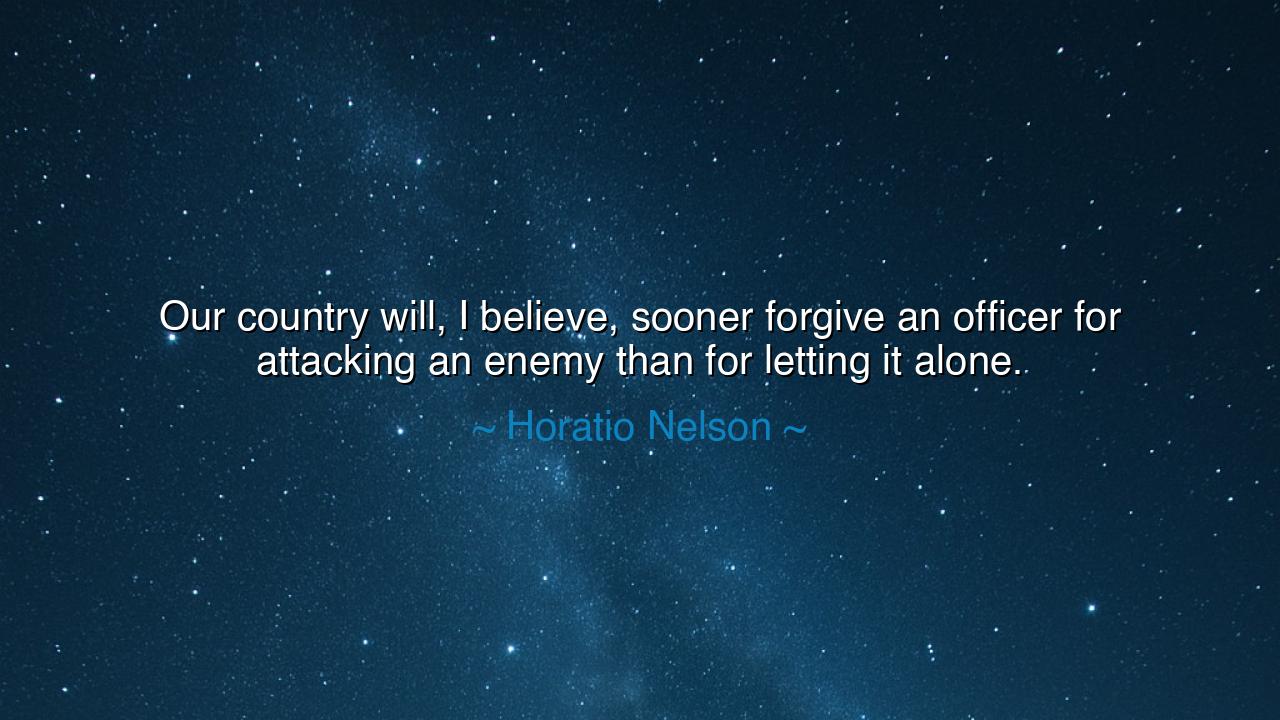
Our country will, I believe, sooner forgive an officer for
Our country will, I believe, sooner forgive an officer for attacking an enemy than for letting it alone.






“Our country will, I believe, sooner forgive an officer for attacking an enemy than for letting it alone.” — These immortal words of Horatio Nelson, the lion-hearted admiral of the British seas, rise like a trumpet call across the ages. They are not merely a statement of military valor, but a declaration of the human spirit’s sacred duty to act, to strive, to face adversity with courage rather than shrink from it. In these words lies the soul of a warrior, but also the wisdom of a philosopher: that it is nobler to risk all in bold action than to rot in the cowardice of inaction.
For Nelson, courage was not the absence of fear—it was the mastery of it. The sea was his battlefield, and its storms his teachers. He understood that to live in hesitation is to die in spirit before one dies in flesh. When he said that a country forgives boldness more readily than caution, he spoke not only of England, but of all nations, all peoples, all hearts that yearn for greatness. Humanity, in its deepest nature, honors the one who dares. A failed strike is more sacred than a fearsome silence. The attack, even when uncertain, declares faith in one’s purpose; the refusal to act proclaims only doubt and decay.
History itself bears witness to this truth. When Nelson faced the combined fleets of France and Spain at Trafalgar, he knew that hesitation would be death. Outnumbered, battered by the winds of fate, he gave the signal that has echoed ever since: “England expects that every man will do his duty.” He attacked, not because victory was certain, but because inaction would betray the spirit of his people. And though the battle took his life, it secured his country’s dominion of the seas. His name lived on—not as one who was cautious, but as one who was fearless. To this day, the world remembers the man who struck, not the one who waited.
This is a truth that transcends war. In every walk of life, from the humble craftsman to the ruler of nations, there comes a moment when one must choose between action and fear. To “let it alone” may seem wise, safe, prudent—but it is the safety of the tomb. The fire of progress, invention, and creation is lit only by those who dare to strike the flint. Consider the explorer Christopher Columbus, who set sail into a sea of uncertainty, mocked by kings and scholars alike. He might have stayed home, content in comfort—but he attacked the unknown. And though he did not find what he sought, his boldness reshaped the world.
The ancients would have called Nelson’s creed a law of the cosmos: that motion is life and stagnation is death. To act is to be alive—to take the sword, to challenge fate, to risk one’s comfort for something higher. Those who hesitate, who let opportunity pass, become as statues among the living. Even the gods favor those who dare. The Greeks told of Athena, who guided the brave but turned her face from the timid. She did not bless the one who prayed for safety, but the one who went forth to battle for virtue and glory.
Therefore, let Nelson’s words be a torch to all who live in times of doubt. When the moment of choice comes—whether in love, in duty, in ambition—choose action over fear. Strike, even if your hand trembles. A failed attempt carries the fragrance of honor; hesitation reeks of decay. The world forgives the one who errs in pursuit of greatness, but it cannot forgive the one who stands idle while destiny calls. For to live without daring is the truest defeat.
And so, the lesson is clear, and its wisdom eternal: act boldly, even at the risk of failure. To act is to affirm life; to hesitate is to deny it. Do not wait for perfect winds or calm seas—hoist your sails and set forth. Better to perish in the storm than to live forever in the harbor. For it is in the attack, not the retreat, that heroes are born, and it is through their courage that nations, and souls, endure.






AAdministratorAdministrator
Welcome, honored guests. Please leave a comment, we will respond soon